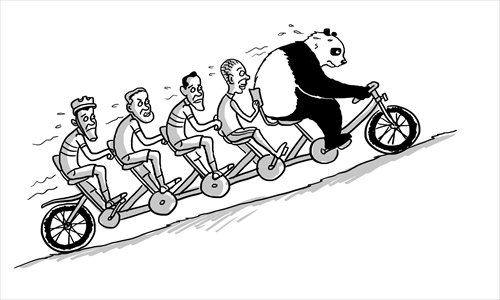Balanced approach will help nation ride wave of global rise

The BRICS economies have contributed almost twice as much to world economic growth as developed countries since the international financial crisis began.
Given economic contraction in the EU and Japan, and anemic US growth, the BRICS nations retain the greatest potential to be the world's main locomotive of economic growth, since other developing economies are too small to play this role.
Therefore when BRICS leaders meet for their summit in South Africa at the end of March, it is important they maximize mutual benefits from their relations.
BRICS has a firm basis for cooperation. Goldman Sachs analyst Jim O'Neill's coinage of his now famous term "BRIC" was not simply smart salesmanship but reflected economic reality.
The frequently made statement that developing economies are advancing compared to developed ones significantly oversimplifies the world situation.
Low-income countries, on World Bank definitions, have not increased their share of world GDP, which was 0.7 percent in 1990 and the same on the latest available data.
The key global trend could be termed "the rise of the global middle." The share of middle-income economies in world GDP, again by World Bank definitions, more than doubled from 16 percent in 1990 to 33 percent in 2011 at market exchange rates, 45 percent if measured by parity purchasing power.
Because they are all large middle-income economies, therefore with common problems, by working together the BRICS nations project common interests. This is particularly necessary given the resistance by developed economies, in particular the US, to changing the existing global economic status quo.
For example, two years after it was agreed, the US has still not ratified, thereby blocking, even modest changes in IMF voting rights. This is why those tied to the global status attempt to minimize or split BRICS.
For instance, well-known US economist Nouriel Roubini claims that Asia's real dynamic potential is in US ally the Philippines, which has 3 percent of China's GDP.
Nevertheless, the BRICS nations' common economic concerns do not automatically solve all key issues of coordination.
One is that China's economic performance is so much more successful than any other major economy that its GDP is now larger than all other BRICS countries put together.
On the one hand, China's economic growth tremendously strengthens the BRICS nations.
For example the slowdown in advanced economies is creating difficulties for many middle-income economies. It has led to global commodity prices falling 15 percent below their peak, negatively affecting Brazil, South Africa, and Russia's main exports.
But China is fundamentally a manufacturing economy with a huge demand for such commodities. Strategically, all BRICS nations aim to build manufacturing, but this is a medium-term project. In the short run, only China can purchase large quantities of BRICS key exports.
China and the other BRICS economic interests therefore intersect with two dynamics.
First, even in the short term, the best way China can aid other BRICS nations is by the fastest possible growth of its economy and therefore imports, in which the benefits to BRICS from this are greater than anything else.
Second, China has clearly tried to maintain a balanced position within BRICS. For example, discussion on a BRICS development bank centered on each country putting in $10 billion - although this poses difficulties for the smaller South African economy.
Given China's own domestic financial resources, the great majority will be invested in projects outside China, and China will essentially aid other BRICS economies. Some would like China to go still further, but this must depend on wider considerations.
For example, China would be foolish to give substantial aid through a development bank, or anything else, if voices in India arguing for it to become part of an anti-China encirclement became dominant.
"Crossing the river by feeling stones," taking steps forward but testing each one, has been an excellent guide for China's economic reform. It is likely to remain so on the highly desirable path of strengthening BRICS cooperation.
The author is a senior fellow of the Chongyang Institute for Financial Studies, Renmin University of China. opinion@globaltimes.com.cn
Counterpoint: Generosity within BRICS offers China passport to power